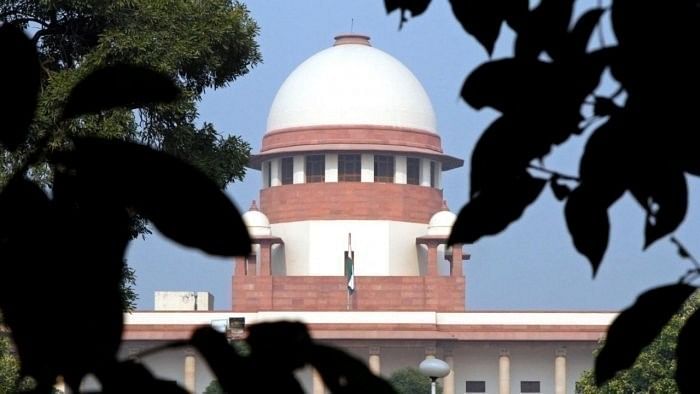
The Supreme Court of India.
Credit: PTI File Photo
New Delhi: The Supreme Court on Monday said that the term “secularism” is part of the Constitution's basic structure and there are a number of judgments, which make it clear that it has been given a status of unamendable portion.
A bench of Justices Sanjiv Khanna and Sanjay Kumar said that if one looks at the right to equality and word fraternity used in the Constitution as well as the fundamental rights under Part III, there is a clear indication that secularism has been held as the core feature of the Constitution.
He said, “As far as secularism, when the Constitution was adopted and discussion was going on we only had the French model. The way we have evolved it is something different. The rights we have given….we have balanced it out”.
“Word socialist, of course, if you go by Western concept, it has a different connotation but we have not followed that. We are very happy with changes which have taken place…the economic growth which has taken place,” the bench said.
The court was hearing a batch of petitions challenging the inclusion of the words "socialist" and "secular" in the Preamble to the Constitution.
Petitions were filed by Balram Singh, senior BJP leader Subramanian Swamy, and advocate Ashwini Kumar Upadhyay challenging the amendment to the Preamble.
The bench said there are a number of judgments in which the Supreme Court has said that secularism is part of the basic structure and, in fact, it has been given a status of unamendable portion as basic structure.
Swamy said the Preamble has a date of November 26, 1949, and what has been appended is not in consonance to that and that has to be rectified.
“The Preamble is not correct in the sense of saying…in our constituent assembly November 26, 1949 ... additions should have been as a separate paragraph,” Swamy said.
The bench said amendments are always made and there are amendments in the Constitution, and the amendment portion is put in brackets.
“Everybody knows about the 42nd amendment….there were other amendments also made in the Constitution,” he said.
Swamy said the Preamble can be in two parts, one which has the date and the other which may have the other date, and that is permissible.
The bench fixed the matter for further hearing in the week commencing on November 18, and asked the petitioners' counsel to submit relevant documents so it could examine them.
During the hearing, the bench told one of the petitioners, "You don't want India to be secular?"
Advocate Vishnu Shankar Jain replied that his client, Balram Singh, is not saying that India is not secular, instead “we are challenging this amendment”.
He said that Ambedkar had opined that the inclusion of the word "socialism" would curtail personal liberty.
The bench said that socialism can also mean that there should be equality of opportunity and wealth of the country should be distributed equally, while asking the counsel not to take the Western meaning.
Jain argued that the 42nd Amendment to the Constitution in 1976, which affected these changes, was never debated in Parliament.
The bench said, "The words have varied interpretations. Both words have different interpretations today”.
“Even our courts have declared them, time and again, as part of the basic structure (of the Constitution)," the bench observed.
Upadhyay cited the Emergency imposed by the Indira Gandhi government during which this amendment was affected.
The bench pointed out that the apex court had struck down statutes that go against secularism.
Upadhyay claimed that the two words, which were added to the Preamble opened a Pandora's box. "We have always been secular. By this insertion, a box has been opened, tomorrow the word democracy can be removed," Upadhyay submitted.
Upadhyay said that there was no will of the people during the insertion of these words.
